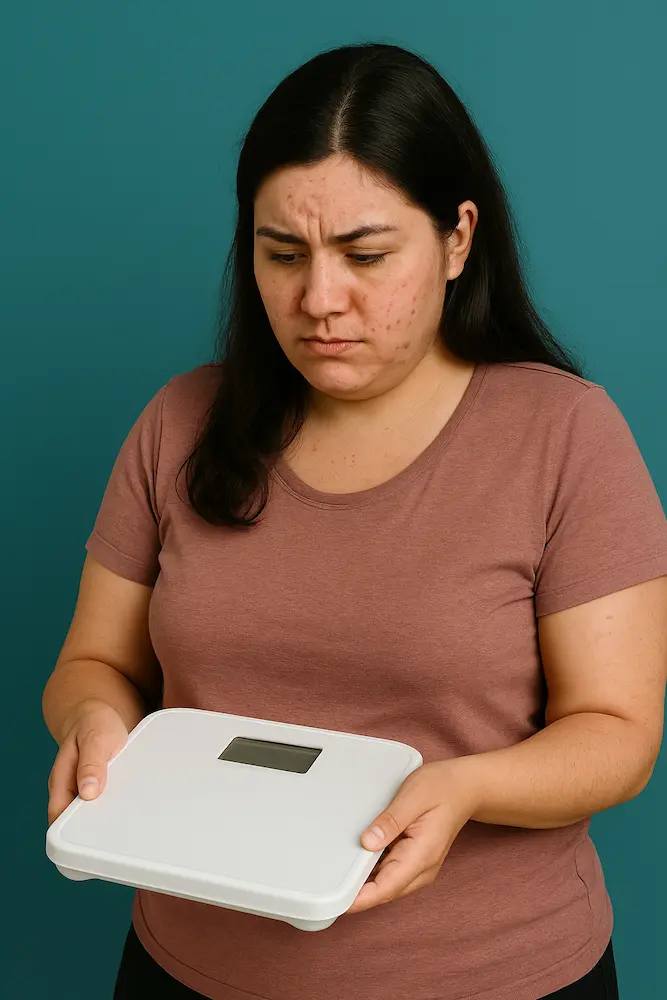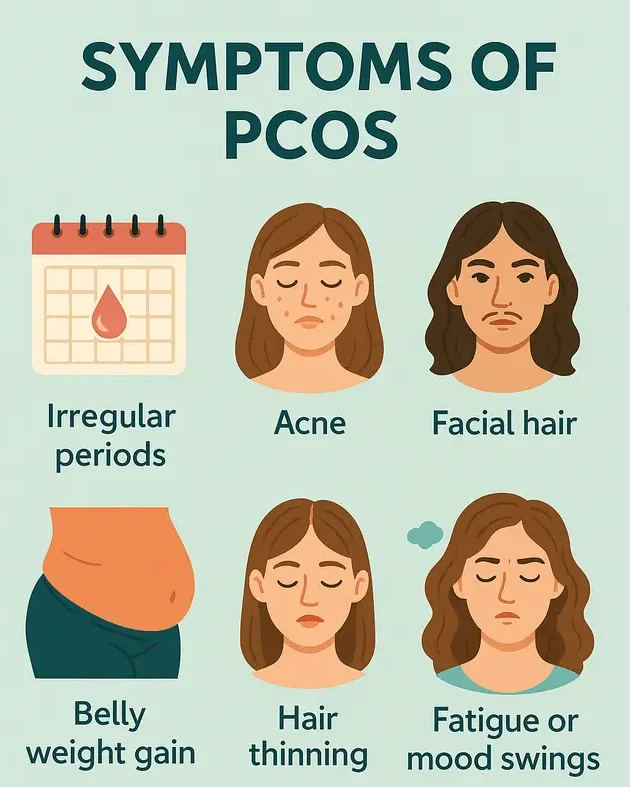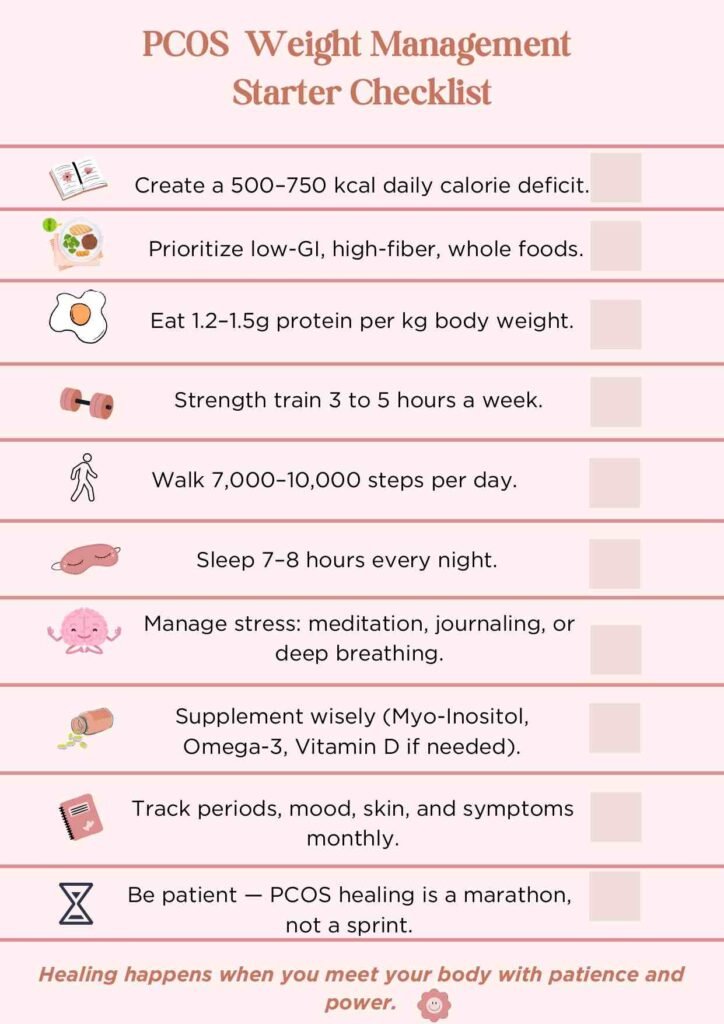
Introduction
If you are struggling with weight gain, irregular periods, or stubborn acne, and doctors just tell you to “lose weight,” you are not alone. Polycystic Ovary Syndrome (PCOS) affects millions of women around the world, but it is often misunderstood.
Managing your weight with PCOS is not just about looking good. It is about healing your body from within, balancing your hormones, improving your fertility, and feeling your best every single day.
In this guide, I will explain PCOS and weight management in the simplest way possible, using real-life examples, proven science, and actionable advice that you can trust. No complicated medical jargon. Just real solutions.
What is PCOS?
PCOS is a hormone disorder that affects how a woman’s ovaries work. It leads to three main problems:
- Irregular periods or no periods at all
- High levels of “male hormones” (like testosterone)
- Ovaries that may have many small cysts (tiny, immature eggs)
Common symptoms include:
- Weight gain, especially around the belly
- Acne and oily skin
- Excess hair growth on face, chest, back
- Hair thinning on the scalp
- Fertility issues
Real-Life Example:
Imagine you are 25 years old, and you are eating clean and working out, but the weight keeps climbing. Your periods are unpredictable. Your skin breaks out like you’re a teenager again. Friends and family don’t understand. This is the daily life of many women with PCOS.

How to Confirm If You Actually Have PCOS (When Doctors Don’t Help)
PCOS cannot be diagnosed based only on symptoms. Medical science uses Rotterdam Criteria, which says you must meet 2 out of 3 conditions:
- Irregular or No Ovulation — cycles longer than 35 days, or very unpredictable periods.
- Signs of Excess Androgens — visible (acne, excess facial/body hair) or blood test (high testosterone).
- Polycystic Ovaries on Ultrasound — “string of pearls” appearance.
Important:
- You do NOT need to have cysts to have PCOS.
- Doctors must rule out thyroid problems, high prolactin, and Cushing’s syndrome first.
Self-Check Example:
- No periods for 4 months
- Chin hair growing that was never there before
- Stubborn belly fat even after clean eating
If you have 2 or more of these issues, PCOS is likely, but a blood test and ultrasound can confirm.
Real Story:
Simran, 27, was told her issues were “just stress.” She tracked her missing periods and chin hair growth, pushed for testing, and finally confirmed PCOS with a new doctor. Never ignore your symptoms.

How PCOS Affects Your Body
Insulin Resistance: Your cells stop responding well to insulin, the hormone that moves sugar into your cells. This causes high blood sugar, high insulin, and more fat storage, especially around the belly.
High Androgens: PCOS causes the ovaries to make more “male hormones,” leading to acne, excess hair growth, and hair thinning.
Inflammation: Chronic low-grade inflammation makes weight loss harder and worsens insulin resistance.
Leptin and Hunger Signals: Women with PCOS often have “leptin resistance,” meaning the brain doesn’t get the stomach “full” signal easily. This leads to constant cravings and overeating.
Mental Health: Anxiety, depression, and mood swings are more common due to hormonal imbalances.
Real-Life Connection: If you feel like you are “always hungry” and gaining weight faster than others around you, it is not your fault. PCOS changes your hormones, not your willpower.
Why Even Lean Women with PCOS Struggle with Weight and Metabolism
While most people associate PCOS with weight gain, many women who are slim or “normal weight” still experience the internal effects of PCOS — like insulin resistance, hormonal imbalance, and infertility.
Even without visible obesity, they may store more visceral fat (around organs), and struggle to lose weight, build muscle, or maintain energy.
Research shows up to 30% of PCOS women are lean but still insulin-resistant. Weight is not always the full story — metabolism matters.
Why Weight Management is Crucial in PCOS
Losing just 5-10% of your body fat can:
- Improve insulin sensitivity
- Lower testosterone levels
- Bring back regular periods
- Boost fertility
- Reduce risk of Type 2 diabetes and heart disease
- Improve emotional well-being
Case Study:
Neha, 32, weighed 85 kg. She lost 7 kg fat over 6 months by following a simple low-GI diet, lifting weights 3 times a week, and sleeping better. She had no periods for a year — and after her fat loss, her periods returned naturally without medications.

What Science Says About How to Lose Fat with PCOS
1. Diet: Focus on Low-GI, High-Protein Foods
- Low-GI foods like oats, quinoa, and lentils keep blood sugar stable.
- Protein (chicken, eggs, Greek yogurt) helps with fullness.
- Avoid sugary, processed foods.
Simple Meal Example: Grilled chicken + Quinoa salad + Cooked broccoli
2. Exercise: Strength Training is a Game-Changer
- Lifting weights 2-3x per week improves insulin resistance.
- Walking 7,000-10,000 steps a day boosts fat burning.
Sample Weekly Plan:
- Monday: Strength workout
- Wednesday: Walk + Core
- Friday: Strength workout
- Saturday: Yoga or slow cardio
3. Sleep and Stress: Two Secret Weapons
- Sleep 7-8 hours to balance appetite hormones.
- Manage stress through meditation, journaling, deep breathing.
4. Supplements That Work
- Myo-Inositol + D-Chiro Inositol: Improve ovulation and insulin sensitivity.
- Berberine: Works like Metformin (but natural).
- Omega-3: Reduces inflammation.
- Vitamin D: Supports hormone balance.
(Always consult a healthcare provider before starting supplements.)
Top 3 Evidence-Based Supplements
While no supplement replaces a healthy lifestyle, a few natural compounds have strong clinical backing for PCOS support:
1. Myo-Inositol + D-Chiro Inositol
Shown to improve ovulation, reduce insulin resistance, and support fertility in PCOS.
2. Berberine
Works similarly to Metformin but naturally. Improves insulin sensitivity, lipid profile, and body composition.
3. Omega-3 Fatty Acids
Help reduce systemic inflammation and balance androgens.
Always consult a doctor before adding any supplement.
Sustainable Strategies for PCOS Weight Loss
- Create a calorie deficit without extreme dieting.
- Focus on real, whole foods.
- Build muscle to improve metabolism.
- Sleep, de-stress, and be kind to yourself.
- Track your cycle and symptoms monthly.
- Supplements are helpers, not magic pills.
- Mindful eating to prevent binge cycles.
Mindset Tip: You don’t need to lose 20 kg in 2 months. Losing 5% of your weight steadily can change your health and life forever.
Bonus: Get yourself a Weight management Checklist at the end of this article
Myths About Weight loss during PCOS
- “You can’t lose weight with PCOS.” (MYTH) — It’s harder but 100% possible.
- “Keto is the only diet.” (MYTH) — Many diets can work if they fit you.
- “Metformin alone will solve it.” (MYTH) — Medications help, but lifestyle change is the real cure.
Real-Life Success Example: A Complete Journey
Ritu, 28, had severe PCOS. She committed to:
- Low-GI eating
- Weight lifting twice a week
- 8 hours sleep
- Myo-Inositol supplementation
After 8 months:
- Lost 12 kg
- Regained regular periods
- Conceived naturally after 2 years of infertility
- Built confidence and emotional strength
Moral: Tiny daily wins lead to big life changes.
How Weight Gain Affects Mental Health (And What to Do About It)
Women with PCOS are 2–3x more likely to experience anxiety and depression. This isn’t just about weight — it’s the emotional toll of hormonal imbalance, fertility fears, body image struggles, and social judgment.
What you can do:
- Track your emotions alongside your cycle
- Join support groups (PCOS Reddit, Facebook communities)
- Speak to a mental health provider who understands hormone-related mood changes
You are not “overreacting.” You are navigating a condition that affects both body and mind.
“You are not broken. You are adjusting to a body that needs deeper care.”
Frequently Asked Questions
What is the best diet for PCOS?
Low-GI, high-protein, anti-inflammatory diets show the best research results.
Is Metformin enough for PCOS weight loss?
No. It helps but lifestyle changes are essential for real, lasting results.
Which supplements are safe for PCOS?
Yes, certain ones (like Myo-Inositol and Omega-3) are well-researched, but consult a doctor first.
Why do I gain weight so fast with PCOS?
Due to insulin resistance, hormonal imbalances, and often leptin resistance affecting hunger control.
Can You Get PCOS Even If You’re Healthy?
Yes, even a woman who lives a healthy, active, low-stress lifestyle with proper nutrition can still develop PCOS— although the likelihood is significantly lower and the severity may be milder.
Here’s why:
PCOS is Not Just a Lifestyle Disease
While insulin resistance and poor lifestyle are major triggers, it is a multi-factorial syndrome, meaning it can result from a combination of:
- Genetics – If there’s a family history, the woman may inherit a predisposition even if she lives healthily.
- Hormonal Imbalances – These can occur due to:
- Brain-ovary signalling disruptions (e.g., GnRH pulses from hypothalamus).
- Excess androgen production from adrenal glands, not just ovaries.
- Environmental Exposures – Endocrine-disrupting chemicals (like BPA from plastics) may play a role even in otherwise healthy women.
- Unknown or Idiopathic Factors – PCOS isn’t fully understood, so some cases arise without any obvious triggers.
So What’s the Point of Living Healthy Then?
Because lifestyle doesn’t always prevent PCOS, but it can dramatically reduce its impact:
Regular exercise, balanced nutrition, and stress management
→ Help maintain insulin sensitivity
→ Normalize cycles
→ Reduce acne and hair issues
→ Improve fertility
→ Lower risk of long-term problems (like diabetes, heart disease)
Analogy:
Think of PCOS like a “loaded gun” — genetics load the gun, but lifestyle pulls or prevents the trigger.
Conclusion
PCOS is not your fault. It is not “laziness.” It is a real medical condition with real solutions.
Weight loss with PCOS is harder — but absolutely possible. Focus on healing, not punishment. Consistency over perfection.
Even losing 5-10% of your weight can transform your hormones, your fertility, your energy, and your entire future.
You are strong. You are capable. You can do this.
“PCOS Weight Management Starter Checklist” — Start Your Healing Journey Today! 🌟

Written by the Health Agenda Team
This guide was created by the team behind the health agenda — a science-driven fitness and wellness platform committed to helping improve their lifestyle. Led by a certified fitness coach and wellness researcher, our content is crafted with care, clarity, and clinical accuracy.
We work alongside a team of female experts who bring lived experience and professional insight to ensure every article addresses women’s real-world concerns with empathy and evidence. With a shared mission to simplify science and support sustainable health transformations, we aim to empower you with practical tools, clear knowledge, and encouragement at every step of your journey.
Struggling with Cravings and Overeating? Check out our article on PCOS Binge Eating, which will help you understand the root cause of your problem with realistic solutions.
Thanks for good information…
Pingback: PCOS Binge Eating: The Truth No One Told You (And What You Can Do About It) 2025 - thehealthagenda.com
Pingback: 10 Hormone Balancing Foods Every Woman Should Eat (Backed by Science) - thehealthagenda.com